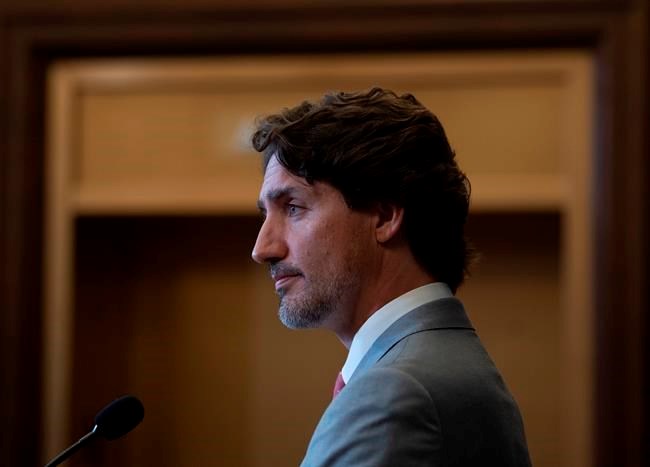OTTAWA — Liberal MPs were surprised by Prime Minister Justin Trudeau's decision to shut down Parliament Tuesday, but many say they believe it was the right call to hit the reset button and deliver a new throne speech, given how COVID-19 has changed the political and economic landscape.
Liberal cabinet and caucus members alike say they were not given advance notice of Trudeau's plans to prorogue Parliament and only learned about it when it was reported in the media Tuesday.
While some might see it as a political tactic to silence committees probing the WE controversy, Francis Drouin, MP for the Ontario riding of Glengarry-Prescott-Russell, said he believes a new throne speech is needed to give Canadians a better look at government's long-term plans.
"To me it just makes sense," he said.
"The issues that we were talking about a year ago aren't necessarily reflecting the realities of what we're now dealing with in our constituencies and what Canadians are dealing with. I think it's the right call."
Veterans Affairs Minister Lawrence MacAulay agreed, saying he believes the situation in Canada and in the world has changed dramatically since the pandemic and Canadians need to see how government plans to respond to those shifting priorities.
"Now is the time to put the road map in place to rebuild the economy and, obviously, that's what Trudeau wants to do and that's what will be done."
A new speech will also prompt a confidence vote, which will require the support of at least one of the main opposition parties to avert defeat of Trudeau's minority government.
Trudeau refuted suggestions Tuesday he was breaking a 2015 election commitment to never use prorogation as a way to "avoid difficult political circumstances." He argued he is inviting a confidence vote to allow his Liberal minority to be given a mandate for their post-pandemic plans.
Many Liberal MPs seem unconcerned about the possibility the vote could trigger an early election after the speech is released Sept. 23.
If opposition politicians want to send Canadians to the polls in the middle of a pandemic, that will be up to them to justify, MacAulay said.
But even as much of Trudeau's caucus appears on board with his hasty decision to pull the plug on Parliament, concerns are being felt in some corners about how the WE affair has played out.
The decision to select WE Charity to administer the multimillion-dollar Canada Student Service Grant has become a political headache for the Liberal government and is being blamed for the sudden resignation Monday of Bill Morneau as minister of finance. Trudeau named Chrystia Freeland to the crucial post Tuesday.
Morneau insisted his decision to leave was based strictly on the fact that he doesn't intend to run for re-election.
Both Trudeau and Morneau have close family ties to the WE organization have apologized for not recusing themselves from the decision to select WE Charity to administer the CSSG. Both are now being investigated by the ethics commissioner over the deal.
WE backed out of the program in early July, citing the controversy, but the political fallout has continued, playing out in Commons committees with marathon grilling sessions by opposition politicians of key WE and government officials, including Trudeau himself,
Rob Oliphant, who is the parliamentary secretary of foreign affairs, said he is glad to see his government will be taking a new focus with prorogation and a new throne speech, as he did not approve of the decision to give WE Charity the ill-fated contract.
"I don't think it was a good decision that cabinet made in the first place," he said.
"I think obviously government was trying to find a fast way to get a program out to help people. I didn't like it from the beginning and I'm very glad it's not happening."
After spending dozens of hours chairing the finance committee's probe of the WE controversy, Liberal MP Wayne Easter said he is not concerned the prorogation has denied Canadians an opportunity to learn the finer details of the affair.
All the key players, both in government and at WE, have appeared at committee and thousands of pages of newly released government documents have offered a lot of information for Canadians, Easter said.
He says he's more concerned that Tuesday's prorogation has left other work of the finance committee unfinished.
This includes hundreds of submissions made during pre-budget consultations for Budget 2021 which weren't made available to the committee before prorogation and now can't be reviewed. The committee also hadn't completed its summary of hundreds of COVID-19 presentations from witnesses over the last four months — information gathered to ensure government's pandemic response would meet the needs of all Canadians.
"With the prorogation, that work is going to be crammed into a very, very tight timeline in the fall and we don't have that advice from the public to give to the minister (Freeland) right now," Easter said.
Virtually all MPs and cabinet ministers who spoke to The Canadian Press said they're not hearing concerns from their constituents in either in small-town Canada or in bigger cities, about the prorogation. Canadians are more concerned about their health, their families and their livelihoods during the pandemic, they said.
Oliphant's office received only two emails and one telephone call Wednesday about the prorogation and, of the 21 calls Oliphant proactively made to constituents during the day, not one person raised it.
"That's the pulse," he said.
This report by The Canadian Press was first published Aug. 19, 2020.
Teresa Wright, The Canadian Press



